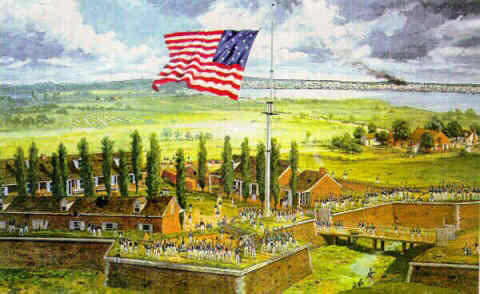|
restoring our biblical and constitutional foundations
|
The Price of Patriotism
Our national anthem, The Star Spangled Banner, was written by Francis Scott Key during the British attack on Fort McHenry on September 13, 1814. The British bombardment, which continued for 25 hours, involved 1,500 bombshells that weighed as much as 220 pounds and carried lighted fuses that would cause them to blow up when they reached their target. Not being very dependable, the bombs often exploded in midair.
 Key watched the battle with apprehension, knowing that as long as the
shelling continued, Fort McHenry had not surrendered. Long before daylight
there came a sudden and mysterious silence. What Key did not know was that
the British
attack had been abandoned, the attackers judging Baltimore as being too
costly a prize.
Key watched the battle with apprehension, knowing that as long as the
shelling continued, Fort McHenry had not surrendered. Long before daylight
there came a sudden and mysterious silence. What Key did not know was that
the British
attack had been abandoned, the attackers judging Baltimore as being too
costly a prize.
In the predawn darkness, Key waited for the sight that would end his anxiety: the sight of Fort Henry’s great flag blowing in the breeze. When at last daylight came, the flag was still there!
Forty-seven years later, Francis Scott Key’s grandson would be arrested by order of President Abraham Lincoln. Lincoln’s suspension of the writ of habeas corpus on April 27, 1861, was based upon his conviction that any person not unconditionally supportive of the war against the South was guilty of treason. In a classic example of political jabberwocky, Lincoln stated, “Arrests by process of courts and arrests in cases of rebellion do not proceed altogether upon the same basis. In the latter case the arrests are made not so much for what has been done, as for what probably would be done.” In other words, what a person might do could now get him arrested by federal authorities!
Because Maryland’s sympathies were with the South, Lincoln interceded to make sure it wouldn’t pass an ordinance of secession. He had Maryland legislators arrested, along with other leading citizens, including newspaper publishers. One of those imprisoned was Francis Key Howard, the editor of the Baltimore Exchange. As he sat imprisoned in Fort McHenry, Howard penned the following words. Ironically, the date was September 13, 1861.
When I looked out in the morning, I could not help being struck by an odd and not pleasant coincidence. On that day, forty-seven years before, my grandfather, Mr. F. S. Key, the prisoner on a British ship, had witnessed the bombardment of Ft. McHenry. When on the following morning the hospital fleet drew off, defeated, he wrote the song so long popular throughout the country, the “Star Spangled Banner.” As I stood upon the very scene of that conflict, I could not but contrast my position with his, forty-seven years before. The flag which he had then so proudly hailed, I saw waving at the same place over the victims of as vulgar and brutal a despotism as modern times have witnessed.
Later, Howard was removed from Fort McHenry to the casemate prison at Fortress Monroe, imprisoned because the federal government “had in its possession ample evidence of the fact, that all who had been arrested had in some way violated the laws.” After further imprisonments in Fort Lafayette in New York Harbor and Fort Warren in Boston, Howard was finally released on November 27, 1862. Upon his discharge from prison, he wrote these powerful words: “We came out of prison just as we had gone in, holding the same just scorn and detestation [for] the despotism under which the country was prostrate, and with a stronger resolution that ever to oppose it by every means to which, as American freemen, we had the right to resort.”
Four months before being discovered and deported to a Nazi concentration camp, Anne Frank wrote in her now famous diary: “I want to go on living even after my death.” Anne Frank wanted to make a lasting difference in her world. As we see the storms of despotism arise in our nation, we, too, must see the importance of being concerned and involved.
I believe every follower of Jesus Christ who values liberty must be responsible to do something. I also suggest that every believer in Jesus Christ must stand up for faithfulness to Scripture, for the founding principles of this nation, and for obedience to Christ’s call to resist the oppressors and destroyers of this age. Doing something, even if it feels hopeless or seems insignificant, is better than doing nothing at all. We are commissioned by our Lord onto the streets, footpaths, and byways of the world to minister to the whole person, whoever he or she may be.
September 16, 2003
David Alan Black is the editor of www.daveblackonline.com.